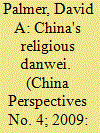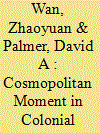|
|
|
Sort Order |
|
|
|
Items / Page
|
|
|
|
|
|
|
| Srl | Item |
| 1 |
ID:
092469


|
|
|
| 2 |
ID:
179773


|
|
|
|
|
| Summary/Abstract |
The relations between society and non-governmental organizations (NGOs) have been relatively neglected in the field of China NGO studies, which remains largely wedded to a state–NGO problematic within a state–society framework. In this anthropological study of an NGO’s post-Wenchuan earthquake recovery programme, we adopt an actor-oriented approach to identify the main lines of tension between the strategies, rationalities, and techniques deployed by the different actors in the field. Focusing on NGO–society relations, we take the NGO not as an incarnation of society vis-a-vis the state, nor as an incarnation of the state vis-a-vis society, but as a key link in a shifting chain of state and non-state actors that aims to introduce to local society an assemblage of techniques, discourses, and values for the promotion of self-government. This ‘international development package’ is a specific form of what social scientists have theorized as ‘governmentality’. In this case study, the modalities of participation and cooperative self-government promoted within this development package are in tension with local values, social relations, and political structures. The case shows that dynamic tensions between the actors are mediated by the deployment of practices of governance that circulate between international institutions and networks, state agencies, NGOs, and local authorities and actors.
|
|
|
|
|
|
|
|
|
|
|
|
|
|
|
|
| 3 |
ID:
177968


|
|
|
|
|
| Summary/Abstract |
This article outlines the spread of the Bahá’í religion—known in Chinese as Datong jiao 大同教)— as a form of religious cosmopolitanism in Republican China (1912–1949). Originating in Iran, its spread to China can be traced to links with the Ottoman empire, British Palestine, the United States, and Japan. By tracking the individuals, connections, and events through which knowledge of the Bahá’í movement spread in China, our study reveals an overlapping nexus of networks—intellectual reformers, liberal Christians, Esperantists, Confucian modernizers, redemptive society activists, and socialists—that shared cosmopolitan ideals. The Bahá’í connections thus serve as a thread that reveals the influence of a unique ‘cosmopolitan moment’ in Republican China, hitherto largely ignored in the scholarly literature on this period, which has focused primarily on the growth of modern Chinese nationalism. Leading nationalist figures endorsed these movements at a specific juncture of Asian colonial modernity, showing that nationalism and cosmopolitanism were seen as expressions of the same ideal of a world community. We argue that the sociology of cosmopolitanism should attend to non-secular and non-state movements that advocated utopian visions of cosmopolitanism, map the circulations that form the nexus of such groups, and identify the contextual dynamics that produce ‘cosmopolitan moments’ at specific historical junctures and locations.
|
|
|
|
|
|
|
|
|
|
|
|
|
|
|
|
|
|
|
|
|